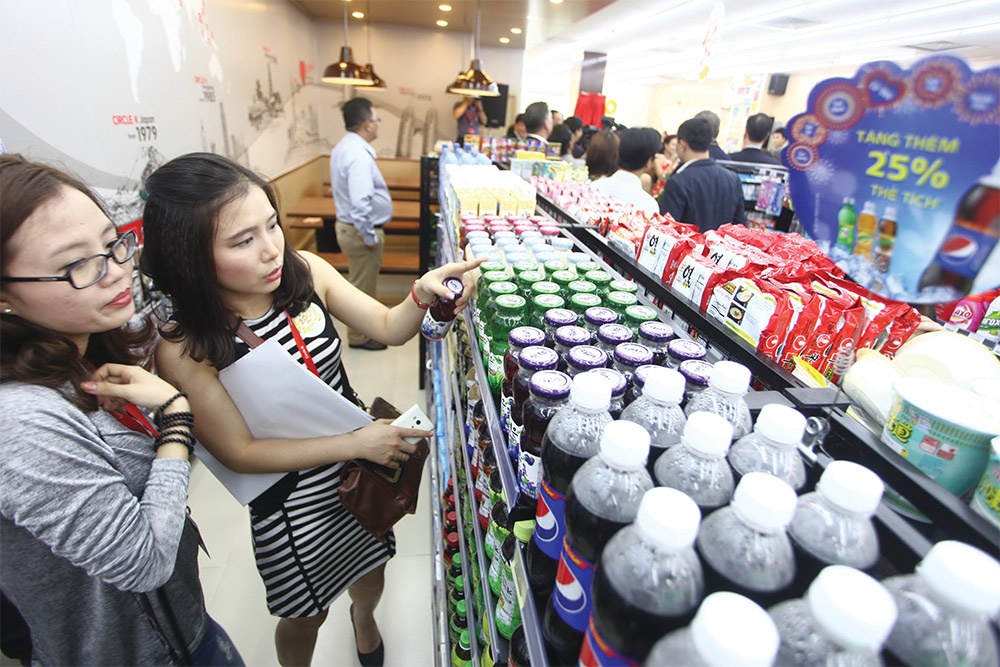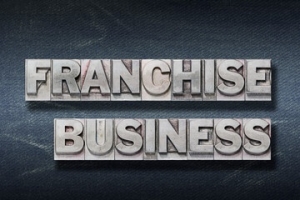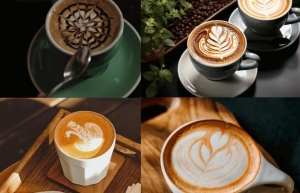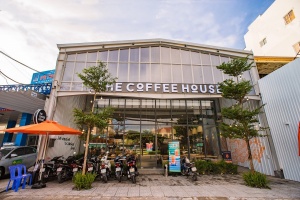F&B companies ramp up net-zero missions
The damage caused by Typhoon Yagi and the growing threat of extreme weather events to business development became key topics of discussion at the 11th Vietnam Corporate Sustainability Forum held in Hanoi last week.
Businesses in the food and beverages (F&B) industry, which are already feeling the direct impacts of climate change, were particularly concerned.
 |
| Younger consumers are driving green product trends in Vietnam and beyond, photo Le Toan |
Binu Jacob, CEO of Nestlé Vietnam and co-chair of the Vietnam Business Council for Sustainable Development, highlighted that climate change’s clear impacts have made sustainable development essential for mitigation, adaptation, and the future.
He stressed that businesses must change their approaches and connect with consumers by understanding their behaviours and preferences to ensure that sustainable initiatives create real value.
“Sustainability and profitability are not two sides of the same coin, but rather two parts of an equation with equal results. However, for businesses, one of the bottlenecks in the transformation process is connecting the sustainability with the core motivations of consumers in making brand choices,” Jacob said.
“Businesses need to change their approach and connect with consumers based on an understanding of customers through their behaviours, needs, and preferences, so that sustainable initiatives truly become value drivers,” he added.
Khuat Quang Hung, director of External Relations and Communications at Nestlé Vietnam, noted that consumer preferences are shifting towards innovative, eco-friendly products with lower emissions and positive environmental impacts. Responding to this, Nestlé’s green transformation agenda aims for net-zero emissions by 2050, aligning with Vietnam’s net-zero commitments.
“We have introduced regenerative farming approaches to help farmers adopt low-emission practices, enhancing soil health, water replenishment, and biodiversity. We are also accelerating digitalisation across our supply chain, involving all partners in this sustainable transformation,” Hung said.
A report by The Business Research Company projects the global F&B market will reach over $9.2 trillion by 2027, with an average growth rate of 6.3 per cent. This trend is pushing F&B companies to focus their research and development on green technology, with 55 per cent of business leaders increasing investment in sustainable processes and products.
Mondelez Kinh Do, an American food company with 25 years in the Vietnamese market, is also committed to sustainable practices, focusing on the environment, economic resilience, and community care.
“We’ve been clear from the start that we want to build our business sustainably,” said Anil Viswanathan, vice president of Mondelez Kinh Do.
“Our sustainability strategy is built on three core pillars: environmental responsibility, economic resilience, and leadership in corporate governance. These pillars guide our efforts to contribute to a sustainable future and align with our mission of being a responsible and innovative leader in the industry,” he added.
Consumer goods companies are increasingly contributing to environmental sustainability by ensuring sustainable packaging, sourcing ingredients responsibly, and operating factories in an energy-efficient, carbon-neutral way. Mondelez is actively increasing the percentage of cage-free eggs in its offerings, with a goal of sourcing 100 per cent of its eggs from cage-free farms by 2030, reflecting its global commitment to sustainable sourcing.
Environmental responsibility is at the heart of Modelez Kinh Do strategy. The company is actively working to reduce carbon footprint and minimise waste through various initiatives. This includes responsible and sustainable ingredients, clean energy power and sustainable packaging solutions.
The company is also leading the shift towards sustainable paper packaging to reduce the import of non-recycled paper. In collaboration with Packaging Recycling Organisation Vietnam, Mondelez is enhancing paper recycling efforts and creating a circular economy. Additionally, the company has partnered with the Ministry of Culture, Sport, and Tourism to support local cultural foundations, recognising the link between community resilience and sustainability.
“Consumer goods companies are increasingly committed to contributing to the environment, ensuring our packaging is sustainable, our ingredients are responsibly sourced, and our business operations are energy-efficient and carbon-neutral,” Viswanathan added.
According to a sustainability report for 2022 by Decision Lab, two-thirds of Vietnamese people are willing to recycle and pay higher prices for eco-friendly products.
Decision Lab interviewed over 1,100 respondents from all over Vietnam. When asked about their level of interest in environmental protection issues, 73 per cent rated environmental issues to be important or very important.
Mai Chinh Ky, director of Public Affairs, Communications, and Sustainability at Coca-Cola Vietnam, noted that manufacturers could feel optimistic about green consumer trends, particularly among younger generations.
“The awareness and consciousness of Gen Y and Gen Z are driving product suppliers to adopt more sustainable and environmentally friendly practices,” Ky said.
Coca-Cola’s sustainable packaging strategy, World Without Waste, targets goals such as using at least 50 per cent recycled materials in packaging and collecting and recycling all bottles and cans sold by 2030.
Since 2020, the company has introduced 100 per cent recycled plastic packaging for Dasani bottled water and replaced Sprite’s blue PET plastic bottles with clear ones to improve recyclability. The launch of Coca-Cola’s 300ml bottle made from fully recycled plastic (excluding cap and label) is helping to reduce over 2,000 tonnes of new plastic annually in Vietnam.
The Ministry of Industry and Trade projects Vietnam’s F&B market revenue will grow to nearly $300 million by the end of 2024, an increase of nearly 11 per cent from the previous year, and to around $1.4 billion by 2029.
Deputy Minister of Industry and Trade Phan Thi Thang stressed that sustainable development trends are evolving, covering aspects like food safety, sustainability in using organic raw materials, reusing and recycling waste, and reducing plastic packaging.
“Changes in consumer behaviour and the demands of the world’s leading importing and consuming markets are pushing sustainability standards across the supply chain. This presents both a challenge and an opportunity for Vietnamese F&B manufacturers and exporters to adapt and grow,” she said.
| Larry Lee, deputy general director Strategic Assets Saigon Beer-Alcohol-Beverage Corporation
Environmental, social, and governance practices guide our approach to green transformation. This means embedding sustainability into every aspect of our operations to meet our net-zero carbon emissions target by 2050. Green transformation means integrating sustainable practices into every facet of our operations. Our goal is to align with our net-zero carbon emissions target by 2050, ensuring that all aspects of our production, from energy use to packaging, support our environmental, social, and governance objectives. The company’s net-zero 2050 strategy focuses on a multi-faceted approach, targeting key areas like energy transition, resource efficiency, sustainable packaging, and carbon offset initiatives. We recognise the importance of cross-industry collaboration in advancing green and eco-friendly products. Our proactive approach includes leveraging partnerships to drive sustainability. We believe this is a significant issue that requires collective effort. The company is actively driving these efforts to build a greener and more sustainable future. To effectively create green and eco-friendly products, fast-moving consumer goods companies can collaborate with other industries in several key ways: eco-friendly packaging, sustainable production processes, and innovative materials and technologies. These collaborations are crucial for advancing the development of eco-friendly products. By working together across industries, we can innovate and push the boundaries of sustainability in our product offerings. |
 | F&B market taking on fresh appeal Vietnam’s food and beverage market is emerging as a hotbed of opportunity, with several companies from neighbouring nations as well as those further afield ramping up activity. |
 | Seizing opportunities in F&B With an average annual growth rate of over 10 per cent, the food and beverages (F&B) market in Vietnam is a dynamic sector. Director of Consumer and Marketing Insights at NielsenIQ Dang Thuy Ha discussed with VIR’s Oanh Do the latest consumer trends helping businesses achieve success in the market. |
 | F&B businesses reluctant to embrace franchising Despite franchising being a hallmark choice in the F&B sector both domestically and internationally, many enterprises remain hesitant to adopt this model. While some brands have established their names through franchise chains, others have chosen to steer clear. |
 | Vietnam’s F&B market exciting for expanding Chinese chains Experts warn that Vietnamese food and beverage businesses may face significant challenges due to the formidable economic power, efficient supply chain management, and trend-setting abilities of Chinese competitors. |
 | 30,000 F&B outlets shut down in first six months of 2024 Vietnam's food and beverage (F&B) market is experiencing drastic changes, with more than 30,000 stores shutting down in the first half of 2024. |
What the stars mean:
★ Poor ★ ★ Promising ★★★ Good ★★★★ Very good ★★★★★ Exceptional
Related Contents
Latest News
More News
- PM outlines new tasks for healthcare sector (February 25, 2026 | 16:00)
- Ho Chi Minh City launches plan for innovation and digital transformation (February 25, 2026 | 09:00)
- Vietnam sets ambitious dairy growth targets (February 24, 2026 | 18:00)
- Masan Consumer names new deputy CEO to drive foods and beverages growth (February 23, 2026 | 20:52)
- Myriad risks ahead, but ones Vietnam can confront (February 20, 2026 | 15:02)
- Vietnam making the leap into AI and semiconductors (February 20, 2026 | 09:37)
- Funding must be activated for semiconductor success (February 20, 2026 | 09:20)
- Resilience as new benchmark for smarter infrastructure (February 19, 2026 | 20:35)
- A golden time to shine within ASEAN (February 19, 2026 | 20:22)
- Vietnam’s pivotal year for advancing sustainability (February 19, 2026 | 08:44)


 Tag:
Tag:




















 Mobile Version
Mobile Version